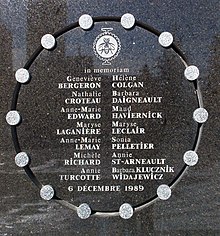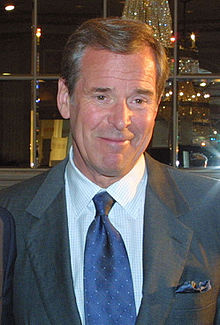Portal:Canada
Introduction
Canada is a country in North America. Its ten provinces and three territories extend from the Atlantic Ocean to the Pacific Ocean and northward into the Arctic Ocean, making it the world's second-largest country by total area, with the world's longest coastline. Its border with the United States is the world's longest international land border. The country is characterized by a wide range of both meteorologic and geological regions. With a population of just over 41 million people, it has widely varying population densities, with the majority residing in urban areas and large areas of the country being sparsely populated. Canada's capital is Ottawa and its three largest metropolitan areas are Toronto, Montreal, and Vancouver.
Canada is a parliamentary democracy and a constitutional monarchy in the Westminster tradition. The country's head of government is the prime minister, who holds office by virtue of their ability to command the confidence of the elected House of Commons and is appointed by the governor general, representing the monarch of Canada, the ceremonial head of state. The country is a Commonwealth realm and is officially bilingual (English and French) in the federal jurisdiction. It is very highly ranked in international measurements of government transparency, quality of life, economic competitiveness, innovation, education and human rights. It is one of the world's most ethnically diverse and multicultural nations, the product of large-scale immigration. Canada's long and complex relationship with the United States has had a significant impact on its history, economy, and culture.
A developed country, Canada has a high nominal per capita income globally and its advanced economy ranks among the largest in the world by nominal GDP, relying chiefly upon its abundant natural resources and well-developed international trade networks. Recognized as a middle power, Canada's strong support for multilateralism and internationalism has been closely related to its foreign relations policies of peacekeeping and aid for developing countries. Canada is part of multiple international organizations and forums. (Full article...)
Featured article -
The École Polytechnique massacre (French: tuerie de l'École polytechnique), also known as the Montreal massacre, was an antifeminist mass shooting that occurred on December 6, 1989, at the École Polytechnique de Montréal in Montreal, Quebec, Canada. Fourteen women were murdered; another ten women and four men were injured.
The perpetrator was 25-year-old Marc Lépine, armed with a legally obtained Ruger Mini-14, 30-round high-capacity magazines, and a hunting knife. He began his rampage at a mechanical engineering class at the École Polytechnique, where he separated the male and female students, ordering the men to leave. He shot all nine women in the room, killing six. For nearly 20 minutes the shooter moved through corridors on multiple floors of the building, the cafeteria, and another classroom, targeting women. He wounded more students and killed eight more women before fatally shooting himself. (Full article...)
Featured biography -
Peter Charles Archibald Ewart Jennings CM (July 29, 1938 – August 7, 2005) was a Canadian-American television journalist, best known for serving as the sole anchor of ABC World News Tonight from 1983 until his death from lung cancer in 2005. Despite dropping out of high school, Jennings transformed himself into one of American television's most prominent journalists. (Full article...)
Selected panorama -
National symbol -
The North American beaver (Castor canadensis) is one of two extant beaver species, along with the Eurasian beaver (Castor fiber). It is native to North America and has been introduced in South America (Patagonia) and Europe (primarily Finland and Karelia). The North American beaver is one of the national symbols of Canada and the official state mammal of Oregon and New York. North American beavers are widespread across the continental United States, Canada, southern Alaska, and some parts of northern Mexico. (Full article...)
Selected vital article -
The history of Canada covers the period from the arrival of the Paleo-Indians to North America thousands of years ago to the present day. The lands encompassing present-day Canada have been inhabited for millennia by Indigenous peoples, with distinct trade networks, spiritual beliefs, and styles of social organization. Some of these older civilizations had long faded by the time of the first European arrivals and have been discovered through archeological investigations. (Full article...)
Selected picture -
Current events
- January 6, 2025 –
- Davivienda, of Colombia, and Scotiabank, of Canada, announced a merger where Davivienda absorbs Scotiabank operations in Colombia, Costa Rica and Panama, and, in turn, Scotiabank acquires 20% of the stakes in Davivienda. (Scotiabank)
- January 6, 2025 – Resignation of Justin Trudeau
- Canadian Prime Minister Justin Trudeau announces his resignation as leader of the Liberal Party and also announces that he will resign as Prime Minister once a new Liberal Party leader is chosen. (BBC News)
- January 1, 2025 – Foreign relations of Mexico
- Mexico's Tax Administration Service implements new tariffs, including a 19% duty on goods from countries without international trade agreements with Mexico and a 17% duty on goods from Canada and the United States under certain value thresholds. (Reuters)
- December 16, 2024 – Resignation of Chrystia Freeland
- Chrystia Freeland resigns as Canada's Deputy Prime Minister and Minister of Finance amid disagreements with Prime Minister Justin Trudeau on increased government spending and how to handle possible U.S. tariffs imposed by the incoming Trump administration. (Reuters)
- December 11, 2024 – Russo-Ukrainian War
- The Parliament of Canada approves the allocation of CA$764 million (US$587 million) in military aid to Ukraine. (Ukrainska Pravda)
- December 3, 2024 – Red Sea crisis
- The Government of Canada officially designates the Yemen-based Houthi movement as a terrorist organization due to the group's attacks on civilian and military vessels in the Red Sea. (Al Jazeera)
Did you know -

- ... that Fredrick Wangabo Mwenengabo, a Congolese-Canadian anthropologist and human rights activist, survived being kidnapped and held for ransom in the Democratic Republic of the Congo?
- ... that an ancient Canadian archaeological site was discovered during the construction of a dump?
- ... that Chickaboom!, by country musician Tami Neilson, was nominated for both Canadian and New Zealand music awards?
- ... that Canadian pentathlon champion J. Howard Crocker introduced volleyball to China?
- ... that Edwin Atwater and his brother were the first people to import glass into Canada?
- ... that in 2019, the Canadian government's Translation Bureau began providing translation services in Dene, East Cree, Plains Cree, and Mohawk?
- ... that the entire inventory of historic string instruments in Canada's Musical Instrument Bank are loaned to musicians in a competition held every three years?
Featured list -
The Tip O'Neill Award is given annually to a Canadian baseball player who is "judged to have excelled in individual achievement and team contribution while adhering to the highest ideals of the game of baseball." The award was created by the Canadian Baseball Hall of Fame and first presented in 1984. It is named after James "Tip" O'Neill, one of the earliest Canadian stars in Major League Baseball (MLB). (Full article...)
Main articles
Associated Wikimedia
The following Wikimedia Foundation sister projects provide more on this subject:
-
Commons
Free media repository -
Wikibooks
Free textbooks and manuals -
Wikidata
Free knowledge base -
Wikinews
Free-content news -
Wikiquote
Collection of quotations -
Wikisource
Free-content library -
Wikiversity
Free learning tools -
Wikivoyage
Free travel guide -
Wiktionary
Dictionary and thesaurus






























